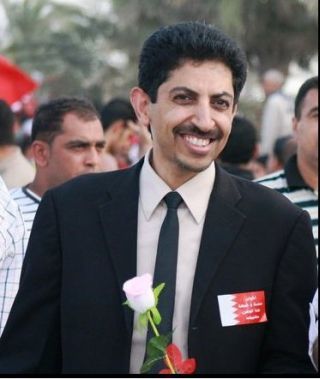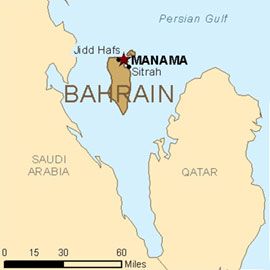
Publisher:
Bonnie King
CONTACT:
Newsroom@Salem-news.com
Advertising:
Adsales@Salem-news.com

~Truth~
~Justice~
~Peace~
TJP
Mar-06-2012 14:23

 TweetFollow @OregonNews
TweetFollow @OregonNews
Bahrain: Release Human Rights Defender Abdulhadi Al-Khawaja
Salem-News.comSalem-News.com Eye on the World report.
 Human Rights Defender Abdulhadi Al-Khawaja |
(DHAKA- Bangladesh) - Bahrain should immediately and unconditionally release Abdulhadi Al-Khawaja from prison. He is well-known human rights defender and founder of the Gulf Centre for Human Rights, former president of the Bahrain Centre for Human Rights, and Mr. Al-Khawaja is a member of IFEX.

This courageous defender of the people’s rights in Bahrain and the Middle East and North Africa region is at huge risk of dying in prison.
Like the Palestinian activists Khader Adnan, and now Hana Al-Shalabi, he started a hunger strike. Since 8 February 2012, Mr. Al-Khawaja has stopped eating, he is now suffering deteriorated health, entering his fourth week without nourishment. In an open letter, Al-Khawaja pledged to stay on hunger strike until “freedom or death.”
Our goal with Eye on the World is to illustrate and highlight politically oriented problems and tragedies that traditional media channels don't have time or interest in covering.
The world has its own set of laws that were agreed upon by the ruling nations in 1948, and many people are not aware of this simple fact. At the root of the concept of world citizenry itself, is the United Nations Universal Declaration of Human Rights, an overriding and supreme law that ensures many essential human rights that governments today fail to observe. Also central to any hope of human success, is the understanding of the human hierarchy of needs, as defined by Abraham Maslow- more information on this at the conclusion of this entry. We must use the Internet as a tool of justice at every junction, and we need to assist all human beings, everywhere, and not allow cultural, racial or religious preferences as determiners.
 Shaikh Hamad bin ‘Issa Al Khalifa |
In this letter, William Gomes contacts His Majesty the King, Shaikh Hamad bin ‘Issa Al Khalifa, in Bahrain, to respectfully demand the immediate release of Al-Khawaja, who should then be transferred to Denmark, where he is a dual citizen, to receive urgent medical treatment needed as a result of his lengthy hunger strike, in addition to the torture he endured while in detention, as documented by the BICI and human rights organisations.
Expressing deep concern about the health of human rights defender Abdulhadi Al-Khawaja, Mr. Gomes urges the Bahraini authorities not to reject this humanitarian call.
| “ |
According to his family and his lawyer, Al-Khawaja can no longer sit up for very long and spends most of his day lying down. The hospital clinic can no longer administer IV fluids as the activist’s veins are too weak. His condition is more severe, and similar to someone who has been on hunger strike for two months. After being arrested in April 2011, Al-Khawaja was sentenced to life in prison in June 2011, as part of a group trial of 21 activists and human rights defenders charged with a range of offences related to their role in peaceful demonstrations in Bahrain in February and March. Human rights organisations and even the Bahrain Independent Commission of Inquiry (BICI) have said the trials did not comply with international standards of due process, nor even Bahrain’s own criminal code, because the 21 men were tried under National Safety Courts. While the BICI recommended the transfer of all cases for review under civilian courts, this has not been done for the case of the 21 activists. I believe that the evidence is clear that Al-Khawaja and the other activists were sentenced in violation of their rights to freedom of expression, assembly and association, contrary to international law and the Universal Declaration of Human Rights. Therefore, we respectfully demand the immediate release of Al-Khawaja, and transfer to Denmark, where he is a dual citizen, to get the urgent medical treatment he needs as a result of his lengthy hunger strike, in addition to the torture he endured while in detention, as documented by the BICI and human rights organisations. I am deeply concerned about the health of human rights defender Abdulhadi Al-Khawaja and urge the Bahraini authorities not to reject this humanitarian call. Your Sincerely William Nicholas Gomes William’s Desk |
” |
Download : Bahrain-Release human rights defender Abdulhadi Al-Khawaja
Maslow's hierarchy of needs
As children we are educated in right and wrong, we are told how to conduct ourselves; we learn both expectations and limitations, and from that point we go forth with these tools, and our individual personalities, and fail or succeed accordingly.
In school we quickly understand that without paper, there is no place to write. Once we have paper, a pen or pencil is required to move to the next point. There is a great analogy that exists between this simple concept of paper and pen, and what we know today as Maslow's hierarchy of needs- the theory in psychology proposed in Abraham Maslow's 1943 paper A Theory of Human Motivation.
He demonstrated how without the correct necessities, a person can do little good for themselves, and has none to offer for others. However when people are housed and have clothing, heat, food, health and security, anything is possible. However if just one of these dynamics is removed from the mix, the chance for success can be adversely affected.
Wikipedia describes Maslow's hierarchy of needs as a pyramid consisting of five levels:
The lowest level is associated with physiological needs, while the uppermost level is associated with self-actualization needs, particularly those related to identity and purpose.
The higher needs in this hierarchy only come into focus when the lower needs in the pyramid are met. Once an individual has moved upwards to the next level, needs in the lower level will no longer be prioritized. If a lower set of needs is no longer be met, the individual will temporarily re-prioritize those needs by focusing attention on the unfulfilled needs, but will not permanently regress to the lower level.
For instance, a businessman at the esteem level who is diagnosed with cancer will spend a great deal of time concentrating on his health (physiological needs), but will continue to value his work performance (esteem needs) and will likely return to work during periods of remission.
And finally, if you care about our efforts, please help us by sending a donation, we seriously need it as ad revenue is very limited, and we aren't doing this to make money. Your support allows our attention to remain with content which is vital. There is a PayPal logo at the top of Salem-News.com. Please help us fight the good fight.
Our PayPal email is bonjtheartists@hotmail.com
Special thanks to William's Desk
 |
 |
 |
 |
 |
Articles for March 5, 2012 | Articles for March 6, 2012 | Articles for March 7, 2012
Quick Links
DINING
Willamette UniversityGoudy Commons Cafe
Dine on the Queen
Willamette Queen Sternwheeler
MUST SEE SALEM
Oregon Capitol ToursCapitol History Gateway
Willamette River Ride
Willamette Queen Sternwheeler
Historic Home Tours:
Deepwood Museum
The Bush House
Gaiety Hollow Garden
AUCTIONS - APPRAISALS
Auction Masters & AppraisalsCONSTRUCTION SERVICES
Roofing and ContractingSheridan, Ore.
ONLINE SHOPPING
Special Occasion DressesAdvertise with Salem-News
Contact:AdSales@Salem-News.com

googlec507860f6901db00.html



Terms of Service | Privacy Policy
All comments and messages are approved by people and self promotional links or unacceptable comments are denied.
[Return to Top]
©2025 Salem-News.com. All opinions expressed in this article are those of the author and do not necessarily reflect those of Salem-News.com.